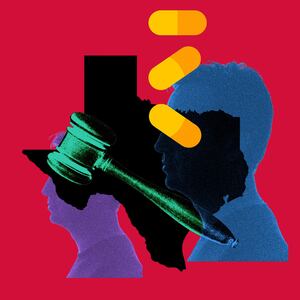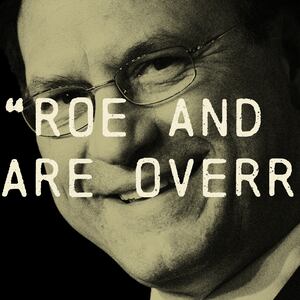Here’s the problem with the latest LGBTQ equality vs. “religious freedom” case that the Supreme Court heard this week, Creative LLC vs. Eleniss. It’s not the substantive result—the case is a close one, and given the six conservative justices’ priors, the result is practically foreordained.
It’s that this narrow case is going to be interpreted much more broadly than it actually is, and that is going to hurt queer people, denigrate our rights to marry, and perhaps lead to those rights being taken away altogether. Which, of course, is exactly why right-wing activists brought it in the first place.
The facts are simple. Lorie Smith is a website designer and devout Christian who wants to make wedding websites. But Smith feels she can’t hang out a shingle for heterosexual but not homosexual ones, thus being forced to choose between compromising her religious beliefs (apparently, Jesus said you can’t make websites for gay people) and running afoul of Colorado’s anti-discrimination law.
So, even though no one was coming after her, no gays even asked for her design services, and, in fact, Jesus told his disciples (Matt. 22:21) to “render unto Caesar what is Caesar and unto God what is God’s”—that is, obey the secular laws of the polity—she sued to get a religious exemption.
The reason this case is so close is that the Supreme Court has held, many times, that it’s unconstitutional to coerce someone to say something, even in a commercial context. Restrictions on commercial activities are one thing, but forcing someone to say or write things they don’t want to say is something else.

Members of both sides of the debate stand in front of the Supreme Court of the United States on Dec. 5, 2022 in Washington, D.C. The High Court heard oral arguments in a case involving a suit filed by Lorie Smith, owner of 303 Creative, a website design company in Colorado who refused to create websites for same-sex weddings despite a state anti-discrimination law.
Kent Nishimura / Los Angeles Times via Getty ImagesThus, as Justice Brett Kavanaugh put it in oral argument, the question is whether web designers are “more like the restaurants and the jewelers and the tailors,” who could be compelled to sell food, jewelry, and clothes to all comers, “or are they more like… the publishing houses and the other free speech analogues?”
Based on today’s oral arguments, that distinction will probably decide the case in Lorie Smith’s favor. Justice Samuel Alito (and probably Justice Clarence Thomas and Neil Gorsuch) will want to go further, saying that disapproving of same-sex marriage isn’t the same as, say, disapproving of interracial marriage (Alito made that point at oral argument). The three liberals will dissent, arguing that web design is a commercial activity. Justice Gorsuch, as he often does, might vote on his own grounds. But the Court’s new center—Chief Justice John Roberts, along with Justices Kavanaugh and Amy Coney Barrett (God help us)—will probably decide that building a website is “speech” and thus should be treated differently from, say, turning gay people away from your pizza parlor.
Now, as a gay dad who worked as an LGBTQ activist for ten years and has been following the weaponization of “religious liberty” since 2013, I have some feelings here. But I also recognize that this is a close case.
Elon Musk’s distortions of the concept notwithstanding, free speech is at the bedrock of our democracy. We don’t want governments forcing people to say things they don’t believe, whether it’s “Nazis are bad” or “Gays are good.” And so, while I think ultimately a wedding website is more like commerce than personal expression, I concede that it’s right on the border.
The trouble is, that’s not how it’s going to be interpreted.
A few years ago, in 2018, the Supreme Court decided another “Gays vs. Religious People” decision, Masterpiece Cakeshop. That one involved a baker who didn’t want to sell a wedding cake to a gay couple (even if one of his employees decorated it). In an idiosyncratic decision, the Court ruled for the baker because the Colorado Civil Rights Commission didn’t take his religious objections seriously, dismissing them as either ridiculous or as a cover for homophobia, or both.
That was a very narrow decision, on somewhat unique grounds. My coverage of the case for The Daily Beast was headlined, “Supreme Court Sides With Anti-Gay Baker. It’s Not a Loss for LGBT Equality.” Because rather than carve out a big religious exemption for any business wanting to turn away gay people, the Court merely decided that governments need to take religious objections into account.
But then came the aftermath. Everywhere, both on the right and the left, the decision was presented as a win for the anti-gay folks. Whether the baker was a hero or a bigot, everyone agreed he won, and that the Supreme Court just said that, yep, you can turn the gays away.
A hundred mini-Masterpiece Cakeshops did exactly that. From petty government officials to, yes, pizzerias, businesses felt emboldened to deny services based on the sexual orientation of their customers. The case was catnip for the Tucker Carlsons and Steve Bannons of the world. It was seen as a victory for Trump. And, I would argue, it was another in the drip-drip-drip of cases that have made same-sex marriage somewhat less equal than straight marriage.

Protesters try to block each other's signs as they gather in front of the Supreme Court of the United States on Dec. 5, 2022 in Washington, D.C.
Kent Nishimura/Los Angeles Times via Getty ImagesFulton vs. Philadelphia, decided last year, was another. Again, the case itself was narrowly decided: a Catholic-affiliated adoption/foster agency wouldn’t place kids with gay couples, and the Court found that the city of Philadelphia didn’t follow its own procedures in considering whether to allow them to do so. But the headlines drove home the idea, “adoption agencies can turn away gay couples.”
This has happened over and over again—including the granddaddy of “religious freedom” cases, Hobby Lobby v. Burwell, about a family-owned business refusing to cover contraception in their Obamacare-mandated insurance plans. That, too, was actually a narrow decision, but it inaugurated an erosion in civil rights that is now a decade old and that culminated (so far) in overturning Roe v. Wade.
That’s the problem with this week’s case. On its facts, it’s close. But it won’t be read that way. When it comes down in a few months, it will be heralded as another setback for same-sex marriage. It will chip away at the underlying right itself. And it might pave the way for the Court to limit or overturn same-sex marriage rights entirely.
Which everyone on the Right knows. This case is bogus. It bears repeating: Smith hasn’t sought or been denied a religious exemption. She’s just suing. But it’s not even her, really; it’s the Alliance Defending Freedom, a largely dark-money-funded Christian Right organization that has been involved in most of the major “religious freedom” cases of the last decade. (I scarequote the term because real religious freedom means being practicing your religion freely, not using it to deny rights to others.)
And if the ADF is like every other legal activist organization, they found this case, and this plaintiff, through careful research and strategic planning. They knew that if they could get a case that’s close enough to free speech—more than the baker, the wedding chapel, the photographer, and the restaurant—they could win. And they knew that a win on any grounds, no matter how narrow, would accomplish their real goal, which is destroying my family by denying it legal protection and recognition.
That’s what this case is really about: overturning Obergefell v. Hodges and leaving same-sex marriage for state legislatures to decide. (The “Respect for Marriage Act”—soon to be signed into law by President Biden—only requires states to respect same-sex marriages from other states, not legalize them themselves.)
It’s about reducing my rights to equality on paper rather than in practice. And eventually, just as the Court did for millions of women last summer, it’s about taking them away entirely.









